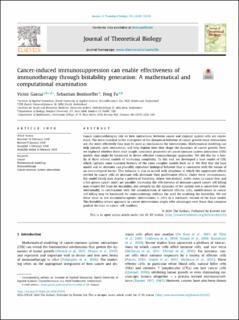Bitte benutzen Sie diese Kennung, um auf die Ressource zu verweisen:
https://doi.org/10.21256/zhaw-19962| Publikationstyp: | Beitrag in wissenschaftlicher Zeitschrift |
| Art der Begutachtung: | Peer review (Publikation) |
| Titel: | Cancer-induced immunosuppression can enable effectiveness of immunotherapy through bistability generation : a mathematical and computational examination |
| Autor/-in: | Garcia, Victor Bonhoeffer, Sebastian Fu, Feng |
| et. al: | No |
| DOI: | 10.1016/j.jtbi.2020.110185 10.21256/zhaw-19962 |
| Erschienen in: | Journal of Theoretical Biology |
| Band(Heft): | 492 |
| Heft: | 110185 |
| Erscheinungsdatum: | 6-Feb-2020 |
| Verlag / Hrsg. Institution: | Elsevier |
| ISSN: | 0022-5193 1095-8541 |
| Sprache: | Englisch |
| Schlagwörter: | Cancer; Cancer-immune system interaction; Immunotherapy; Mathematical modeling |
| Fachgebiet (DDC): | 616: Innere Medizin und Krankheiten |
| Zusammenfassung: | Cancer immunotherapies rely on how interactions between cancer and immune system cells are constituted. The more essential to the emergence of the dynamical behavior of cancer growth these interactions are, the more effectively they may be used as mechanisms for interventions. Mathematical modeling can help unearth such connections, and help explain how they shape the dynamics of cancer growth. Here, we explored whether there exist simple, consistent properties of cancer-immune system interaction (CISI) models that might be harnessed to devise effective immunotherapy approaches. We did this for a family of three related models of increasing complexity. To this end, we developed a base model of CISI, which captures some essential features of the more complex models built on it. We find that the base model and its derivates can plausibly reproduce biological behavior that is consistent with the notion of an immunological barrier. This behavior is also in accord with situations in which the suppressive effects exerted by cancer cells on immune cells dominate their proliferative effects. Under these circumstances, the model family may display a pattern of bistability, where two distinct, stable states (a cancer-free, and a full-grown cancer state) are possible. Increasing the effectiveness of immune-caused cancer cell killing may remove the basis for bistability, and abruptly tip the dynamics of the system into a cancer-free state. Additionally, in combination with the administration of immune effector cells, modifications in cancer cell killing may be harnessed for immunotherapy without the need for resolving the bistability. We use these ideas to test immunotherapeutic interventions in silico in a stochastic version of the base model. This bistability-reliant approach to cancer interventions might offer advantages over those that comprise gradual declines in cancer cell numbers. |
| URI: | https://digitalcollection.zhaw.ch/handle/11475/19962 |
| Volltext Version: | Publizierte Version |
| Lizenz (gemäss Verlagsvertrag): | CC BY 4.0: Namensnennung 4.0 International |
| Departement: | Life Sciences und Facility Management |
| Organisationseinheit: | Institut für Computational Life Sciences (ICLS) |
| Publiziert im Rahmen des ZHAW-Projekts: | Exploring the silent fitness landscape |
| Enthalten in den Sammlungen: | Publikationen Life Sciences und Facility Management |
Dateien zu dieser Ressource:
| Datei | Beschreibung | Größe | Format | |
|---|---|---|---|---|
| 2020_Garcia_etal_Cancer-induced-immunosuppression_Theoretical-Biology.pdf | 1.4 MB | Adobe PDF |  Öffnen/Anzeigen |
Zur Langanzeige
Garcia, V., Bonhoeffer, S., & Fu, F. (2020). Cancer-induced immunosuppression can enable effectiveness of immunotherapy through bistability generation : a mathematical and computational examination. Journal of Theoretical Biology, 492(110185). https://doi.org/10.1016/j.jtbi.2020.110185
Garcia, V., Bonhoeffer, S. and Fu, F. (2020) ‘Cancer-induced immunosuppression can enable effectiveness of immunotherapy through bistability generation : a mathematical and computational examination’, Journal of Theoretical Biology, 492(110185). Available at: https://doi.org/10.1016/j.jtbi.2020.110185.
V. Garcia, S. Bonhoeffer, and F. Fu, “Cancer-induced immunosuppression can enable effectiveness of immunotherapy through bistability generation : a mathematical and computational examination,” Journal of Theoretical Biology, vol. 492, no. 110185, Feb. 2020, doi: 10.1016/j.jtbi.2020.110185.
GARCIA, Victor, Sebastian BONHOEFFER und Feng FU, 2020. Cancer-induced immunosuppression can enable effectiveness of immunotherapy through bistability generation : a mathematical and computational examination. Journal of Theoretical Biology. 6 Februar 2020. Bd. 492, Nr. 110185. DOI 10.1016/j.jtbi.2020.110185
Garcia, Victor, Sebastian Bonhoeffer, and Feng Fu. 2020. “Cancer-Induced Immunosuppression Can Enable Effectiveness of Immunotherapy through Bistability Generation : A Mathematical and Computational Examination.” Journal of Theoretical Biology 492 (110185). https://doi.org/10.1016/j.jtbi.2020.110185.
Garcia, Victor, et al. “Cancer-Induced Immunosuppression Can Enable Effectiveness of Immunotherapy through Bistability Generation : A Mathematical and Computational Examination.” Journal of Theoretical Biology, vol. 492, no. 110185, Feb. 2020, https://doi.org/10.1016/j.jtbi.2020.110185.
Alle Ressourcen in diesem Repository sind urheberrechtlich geschützt, soweit nicht anderweitig angezeigt.